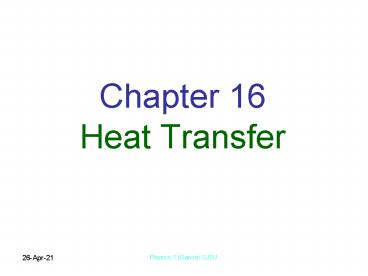Chapter 16 Heat Transfer PowerPoint PPT Presentation
Title: Chapter 16 Heat Transfer
1
Chapter 16Heat Transfer
2
Heat Transfer
- Heat always flows from high temperature objects
to low temperature objects. - Heat flow stops when temperatures equal.
- Various ways by which heat may flow.
Heat flows from child into air
75º
98º
32º
Heat flows from child and air into the ice cream
3
Conduction
- Conduction is heat flow by direct contact.
- Some materials are good thermal conductors,
others are insulators.
Tile floor feels colder than wood floor
98º
98º
75º
75º
Wood is an insulator
Tile is a conductor
4
Demo Torch the Money
- Wrap a dollar bill tightly around a copper pipe.
Put it into a flame.
5
Air is a Poor Conductor
Because air is such a poor conductor, some pizza
ovens dont have a door.
Can safely put your hand in an oven. Metal is
good conductor so you need oven mitt to touch it
safely (cloth is a poor conductor).
6
Demo Boiling Ice Water
- Water and glass are relatively poor conductors of
heat. - Can boil water at the top of a test tube with ice
at the bottom of the tube.
Steel wool prevents ice from floating
7
Convection
- Heat transfer in a fluid often occurs mostly by
convection. - Buoyancy causes warm air to rise, which carries
thermal energy directly by its motion.
8
Demo Candle
Very HOT
Rising hot air above a candle carries most of the
heat generated by the burning flame.
Warm
Shadows reveal rising air currents of hot air.
9
Demo Convection Buoyancy
- Candle goes out while in free fall because in
weightless state hot air does not rise so fresh
air cannot reach the candles wick.
10
Convection Oven
Convection oven has a fan to enhance the
circulation of the air, increasing the transfer
of heat.
11
Demo Candle in a Tube
- Candle stays light until the partition in the
tube is removed. Why?
12
Fiberglass Insulation
- Air is a poor thermal conductor but easily
transfers heat by convection. - Fiberglass insulation is mostly air, with the
fibers disrupting the convection flow.
13
Radiation
- Light has many different wavelengths, most of
which are not visible to the eye. - All light carries energy, thus transfers heat.
Heat Lamp
14
Emission of Radiant Energy
75º
- All objects radiate light higher the temperature
the higher the frequency. - At room temperature the radiated light is at
frequencies too low for our eyes to see. - Special cameras are sensitive to this infrared
radiation.
98º
Attics in this house were kept warm for growing
marijuana.
70
15
Reflection of Radiant Energy
- White objects reflect light, black objects dont.
Hole in a box with white interior looks black
because almost none of the light entering the
hole reflects back out.
White tubes look black inside.
16
Controlling Heat Transfer
- Thermos bottle eliminates conduction and
convection by having double-walled sides with
vacuum. - Silvered interior walls minimize heat transfer by
radiation.
17
Greenhouse Effect
- Glass is transparent to sunlight
(short-wavelength).
Glass is opaque to infrared radiation
(long-wavelength) produced by objects inside
greenhouse, trapping the heat.
18
Earths Greenhouse Effect
- Earths atmosphere acts as a greenhouse, trapping
solar energy. - Most of the trapping is due to carbon dioxide and
water vapor, which is why theyre called
greenhouse gasses.
19
Check Yourself
- What does it mean to say that the greenhouse
effect is like a one-way valve? - Can this build up energy forever?
20
Global Temperature Variations
- Temperatures increased from 1910 to 1940.
- Temperatures then cooled for 40 years until they
started rising again in the 1980s.
21
Greenhouse Carbon Dioxide
- Over past 1000 years temperatures nearly constant
until CO2 emissions increased starting with the
industrial revolution.
Industrial revolution begins
22
Cars Carbon Dioxide
- One gallon of gasoline has about 5.2 lb of
carbon. A 5-lb bag of charcoal (which is pure
carbon) holds about 100 briquettes. - At 26 miles per gallon, thats 0.2 lb of carbon
per mile, or about four to five charcoal
briquettes per mile.
23
Anthropogenic Global Warming
Rising temperatures are due to human production
of greenhouse gases.
Temperature
Caused by humans
24
Consequences of Global Warming
Melting of Polar Ice Caps
Species extinctions
Weather modifications
25
Solutions to Global Warming
- Many simple, small changes together could make a
significant difference.
Efficient Lighting
Efficient Appliances
Building Insulation

